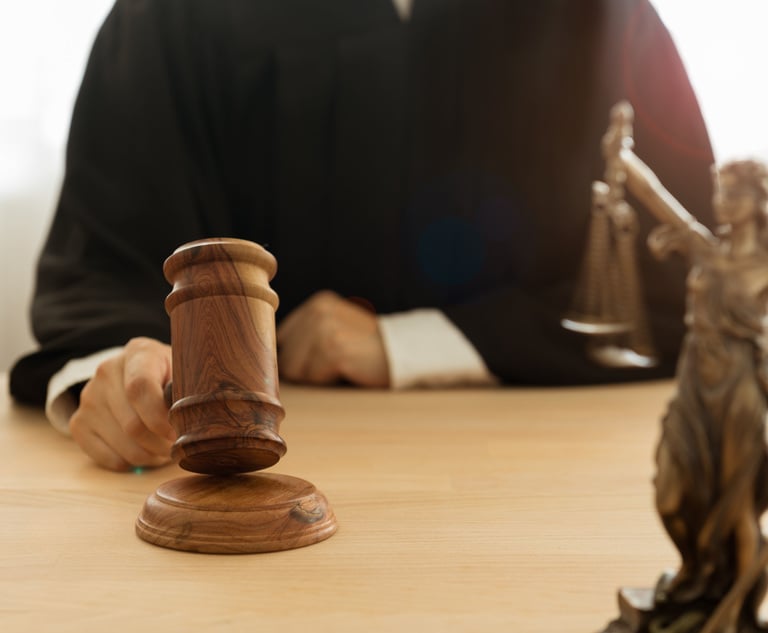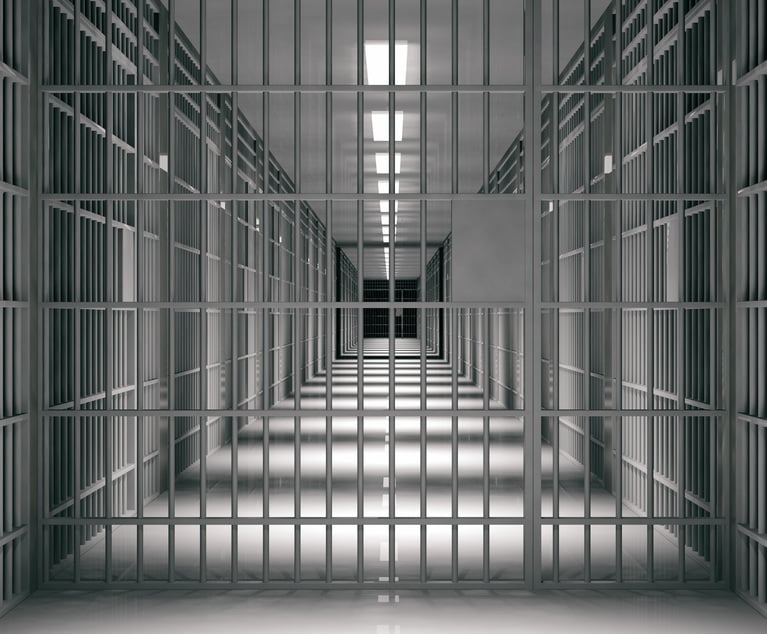After Lawyers Resist, Court Eliminates Opt-Out Provision in Remote Grand Jury Program
The pilot program has been unable to get off the ground because of defendants' ability to opt out.
June 09, 2020 at 06:25 PM
3 minute read
 New Jersey Supreme Court Chief Justice Stuart Rabner. Photo: Carmen Natale/ALM
New Jersey Supreme Court Chief Justice Stuart Rabner. Photo: Carmen Natale/ALM
A controversial program allowing grand jury proceedings via Zoom has gone from optional to mandatory after too many lawyers objected to the concept.
The pilot program has been unable to get off the ground because of defendants' ability to opt out, according to an order signed by Chief Justice Stuart Rabner, which was made public Tuesday. "The requirement that a defendant consent to presentation of charges to a grand jury convening remotely (rather than in person) has inhibited bringing cases before those ready grand juries," Rabner said in the order.
The New Jersey Supreme Court on May 14 said grand juries would be conducted remotely in Bergen and Mercer counties, with jurors following proceedings from home over a computer or tablet, due to COVID-19 restrictions against gatherings of large groups. When it announced the program, the court said the remote grand jury would only hear cases in which the defendant agrees to that forum.
Judiciary spokesman Pete McAleer said in an email that "In order to bring a case before a virtual grand jury, we first sought agreement from the prosecutor, the defense attorney, and the defendant. We did not have agreement from all three in any one particular case."
The number of defendants detained pre-indictment in the state has risen from 1,400 to 1,540 since the program was first announced, Rabner's order said.
"The need to move forward with virtual grand juries will become more urgent as more defendants are detained pre-indictment and additional defendants on pretrial release await indictment," Rabner's order said.
Juries have been empaneled in the counties to carry out the pilot program and have been given special training as well as sworn in under a special supplement to the usual grand jury oath of secrecy.
Defense lawyers have expressed reservations about the remote grand jury concept, including concerns about a possible breach of confidentiality and the loss of in-person contact between the defendant, the defense lawyer and the witnesses.
"No one thinks it's a good idea," said Joseph Rem, a criminal defense lawyer in Hackensack. "This is a critical stage in our criminal process, designed to protect innocent people from false accusations. Grand juries often listen to stories and decide not to indict," said Rem. He said the loss of jurors' ability to see a witness' body language or rolling of the eyes would be lost if the proceedings are held online.
Rem said he would allow his client to take part in the virtual grand jury. But if the defendant were indicted, Rem said he would ask the judge to dismiss the indictment.
Paul Brickfield, a criminal defense lawyer in River Edge, said he thinks the pilot program could lead to more motions to dismiss an indictment. If his client were required to submit to a remote grand jury, he would expect to carefully review the transcript and audio tape to see if anything problematic occurred.
"It may end up creating more litigation," he said. The pilot program "is designed to move the process along but it could end up slowing it down. Defense lawyers will be obligated to examine the whole process."
This content has been archived. It is available through our partners, LexisNexis® and Bloomberg Law.
To view this content, please continue to their sites.
Not a Lexis Subscriber?
Subscribe Now
Not a Bloomberg Law Subscriber?
Subscribe Now
NOT FOR REPRINT
© 2025 ALM Global, LLC, All Rights Reserved. Request academic re-use from www.copyright.com. All other uses, submit a request to [email protected]. For more information visit Asset & Logo Licensing.
You Might Like
View All

Judge Jablonski and Chief Justice Rabner Both Acted Completely Properly
4 minute read
In 2-1 Ruling, Court Clears Way for Decade-Old Wrongful Imprisonment Suit
5 minute read
Trending Stories
- 1'Not the President's Personal Lawyer': Lawyers Share Concerns Over How AG Pick Bondi’s Loyalism to Trump May Impact DOJ
- 2US Judge OKs Partial Release of Ex-Special Counsel's Final Report in Election Case
- 3The Demise of Truth and Transparency in Federal Sentencing
- 4Former Phila. Solicitor Sozi Tulante Rejoins Dechert
- 5'I've Seen Terrible Things': Lawyer Predicts Spike in Hazing Suits
Who Got The Work
Michael G. Bongiorno, Andrew Scott Dulberg and Elizabeth E. Driscoll from Wilmer Cutler Pickering Hale and Dorr have stepped in to represent Symbotic Inc., an A.I.-enabled technology platform that focuses on increasing supply chain efficiency, and other defendants in a pending shareholder derivative lawsuit. The case, filed Oct. 2 in Massachusetts District Court by the Brown Law Firm on behalf of Stephen Austen, accuses certain officers and directors of misleading investors in regard to Symbotic's potential for margin growth by failing to disclose that the company was not equipped to timely deploy its systems or manage expenses through project delays. The case, assigned to U.S. District Judge Nathaniel M. Gorton, is 1:24-cv-12522, Austen v. Cohen et al.
Who Got The Work
Edmund Polubinski and Marie Killmond of Davis Polk & Wardwell have entered appearances for data platform software development company MongoDB and other defendants in a pending shareholder derivative lawsuit. The action, filed Oct. 7 in New York Southern District Court by the Brown Law Firm, accuses the company's directors and/or officers of falsely expressing confidence in the company’s restructuring of its sales incentive plan and downplaying the severity of decreases in its upfront commitments. The case is 1:24-cv-07594, Roy v. Ittycheria et al.
Who Got The Work
Amy O. Bruchs and Kurt F. Ellison of Michael Best & Friedrich have entered appearances for Epic Systems Corp. in a pending employment discrimination lawsuit. The suit was filed Sept. 7 in Wisconsin Western District Court by Levine Eisberner LLC and Siri & Glimstad on behalf of a project manager who claims that he was wrongfully terminated after applying for a religious exemption to the defendant's COVID-19 vaccine mandate. The case, assigned to U.S. Magistrate Judge Anita Marie Boor, is 3:24-cv-00630, Secker, Nathan v. Epic Systems Corporation.
Who Got The Work
David X. Sullivan, Thomas J. Finn and Gregory A. Hall from McCarter & English have entered appearances for Sunrun Installation Services in a pending civil rights lawsuit. The complaint was filed Sept. 4 in Connecticut District Court by attorney Robert M. Berke on behalf of former employee George Edward Steins, who was arrested and charged with employing an unregistered home improvement salesperson. The complaint alleges that had Sunrun informed the Connecticut Department of Consumer Protection that the plaintiff's employment had ended in 2017 and that he no longer held Sunrun's home improvement contractor license, he would not have been hit with charges, which were dismissed in May 2024. The case, assigned to U.S. District Judge Jeffrey A. Meyer, is 3:24-cv-01423, Steins v. Sunrun, Inc. et al.
Who Got The Work
Greenberg Traurig shareholder Joshua L. Raskin has entered an appearance for boohoo.com UK Ltd. in a pending patent infringement lawsuit. The suit, filed Sept. 3 in Texas Eastern District Court by Rozier Hardt McDonough on behalf of Alto Dynamics, asserts five patents related to an online shopping platform. The case, assigned to U.S. District Judge Rodney Gilstrap, is 2:24-cv-00719, Alto Dynamics, LLC v. boohoo.com UK Limited.
Featured Firms
Law Offices of Gary Martin Hays & Associates, P.C.
(470) 294-1674
Law Offices of Mark E. Salomone
(857) 444-6468
Smith & Hassler
(713) 739-1250






